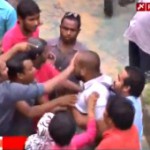“The Maldives stand on a knife edge. At stake is its hard-won liberal democracy, forged from the ruins of a brutal, 30-year dictatorship – a period that was synonymous with serious human rights abuses, including extra-judicial killings and torture,” writes former President Mohamed Nasheed for the Guardian newspaper.
“President Maumoon Abdul Gayoom’s rule was eventually ended in 2008, by a democratic vote in which I was elected. But it is important that the outside world clearly understands that Gayoom, his allies and his henchmen are back.
It was they who established, late last year, the ‘December coalition’ of Islamic extremists who accused my government of being controlled by ‘Jews’ and ‘Christians’ and used incitement to religious hatred and violence as political tools. It was they who orchestrated February’s overthrow of the Maldives’ first democratically elected government.
And it is they who control the current administration as well as the police and armed forces. From this position of strength, they are slowly squeezing the life out of the democratic fabric of my country.
Despite this, the Commonwealth Ministerial Action Group (CMAG), which met last week, is considering removing the Maldives situation from its agenda. A decision is expected in late September later this month. The choice before the group, comprising the foreign ministers of Australia, Bangladesh, Canada, Jamaica, Sierra Leone, Tanzania, Trinidad and Tobago and Vanuatu, could hardly be more important.
Thousands of pro-democracy protesters in the Maldives have been brutalised by the police, arrested and imprisoned. Many of them have been tortured, or charged with terrorism – the favoured means, post 9/11, for repressive states to dispose of opponents. Journalists have been beaten and arrested and media outlets threatened with legal action and closure. Freedom of speech is being strictly curtailed – people can now be arrested for calling members of the current government ‘traitors’. And the country’s independent oversight bodies are being staffed with friends and relatives.
Moreover, a growing sense of impunity is taking hold. Key agents of February’s coup d’etat, and the police officers responsible for the violence that followed, know they cannot be touched. A grotesquely one-sided report into the coup, by the Commission of National Inquiry, was co-chaired by Gayoom’s former defence minister. Despite gross and systematic human rights violations since February – all catalogued by NGOs such as Amnesty International and the International Federation of Human Rights – not one police officer or state representative has been prosecuted. Indeed, many of those responsible have been promoted.”





